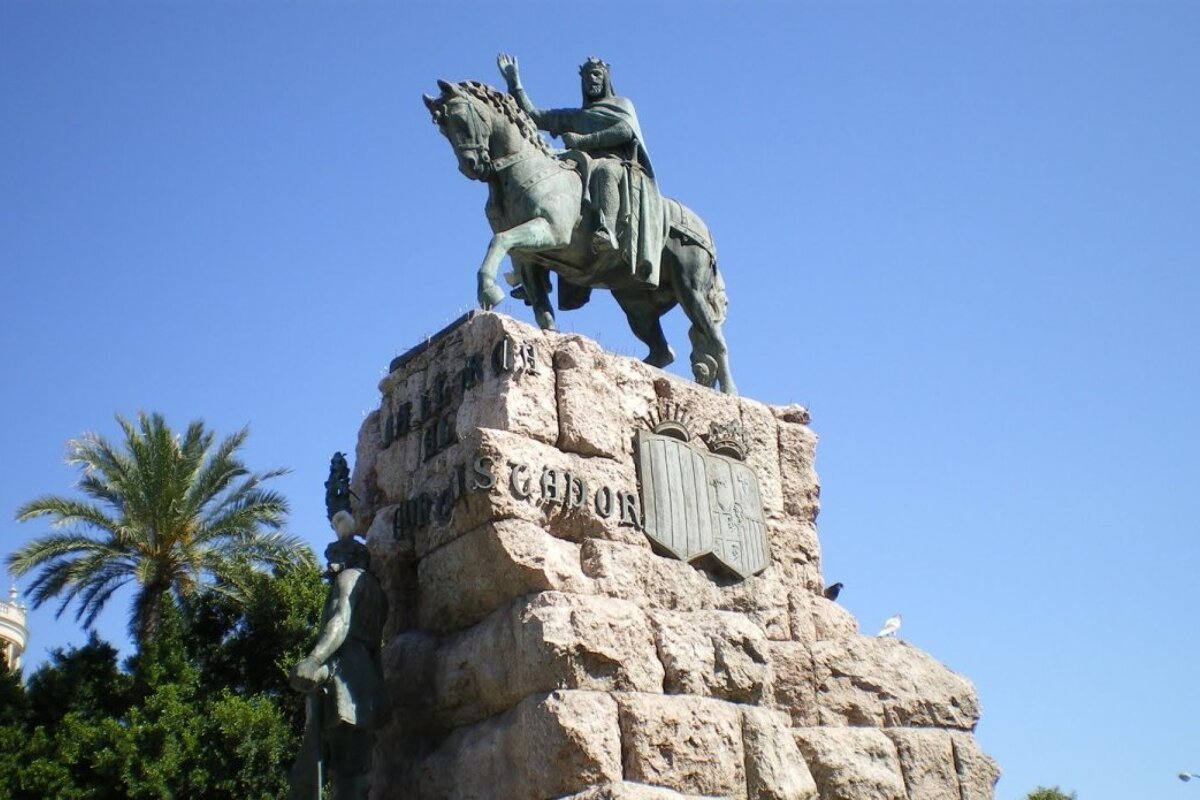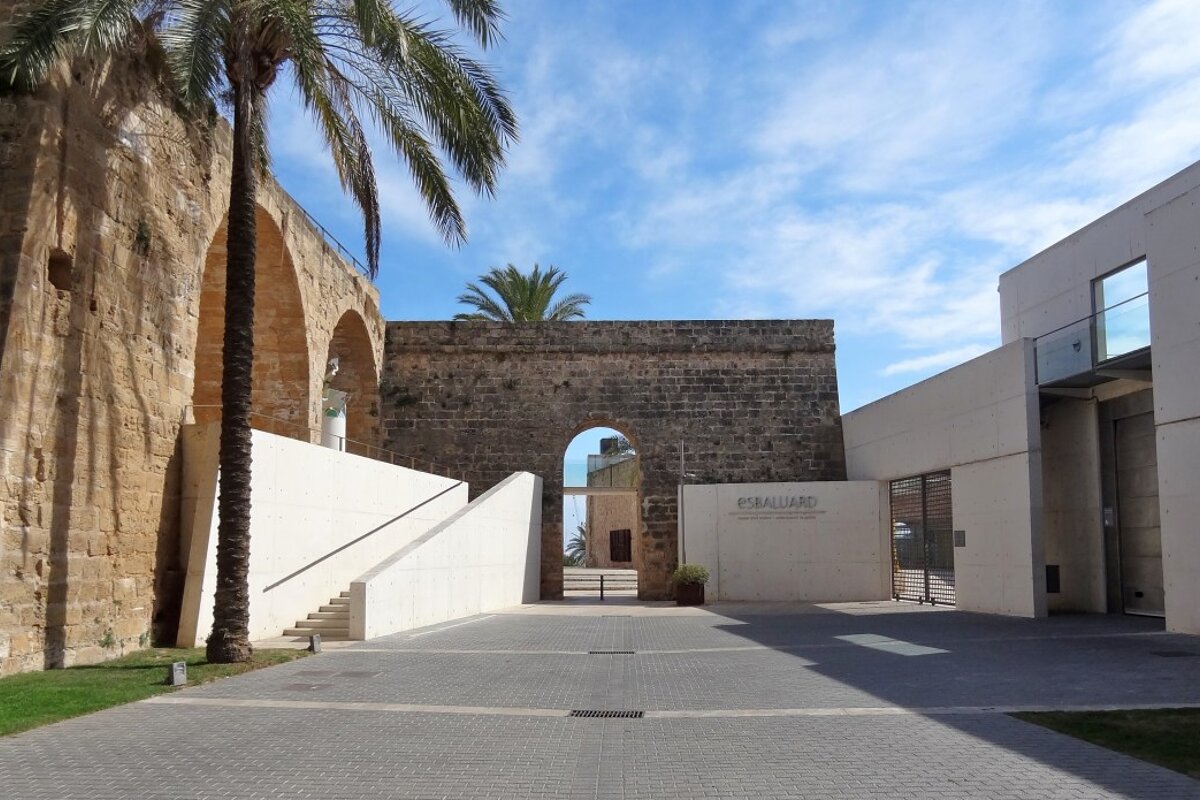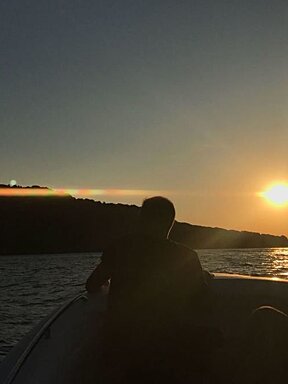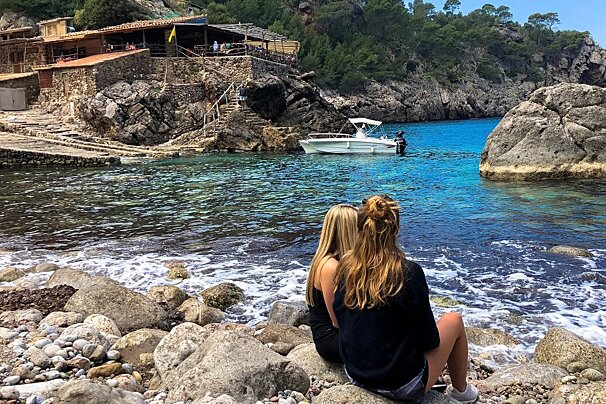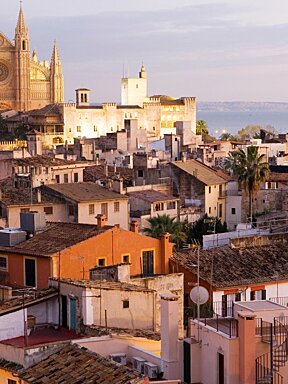
© Ciudadano Sinmitos

© SeeMallorca.com

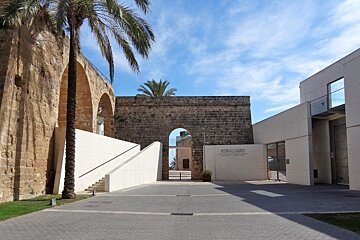
© Wikimedia
History of Mallorca
Discover the Mallorca of yesterday
It may be said that the history of Mallorca is as long as its coastline. Were it not for the 555km (344 miles) of coast, we can be very sure that the island's past, present and future would be very different.
Mallorca, like other major islands of the Mediterranean, has attracted a cornucopia of conquerors, invaders, settlers and tourists, who have all contributed to its richness and vital history. Today you can still see the remains of pre-historic settlements, medieval churches and fortresses, and of course the modern times.
Early history
For most Mallorcans, history didn't really begin until the Catalans retook the island from the Moors in the 13th century. On the other hand, experts date the first islanders to be between 1300 and 1000 BC. Even though the earliest people obviously carried on primitive but active trade with others around the western Mediterranean, the quantity of arms found in their early dwellings shows that the island still had a long way to go before becoming the 'Island of the Calm'.
Because of the location of the archipelago, the Balearic islands found themselves on the great trading routes that criss-crossed the Mediterranean Sea. Eivissa (Ibiza) became an important commercial centre - first for the Phoenicians, then the Carthaginian traders. While Majorca played only a minor part in these 8th and 7th century cultures, there are references in classical texts to Mallorcan honderos (stone slingers) fighting for the Carthaginians in the Punic wars.
When the victors (the Romans) finally tired of the piracy that was rife in the Baleares, they organised an expedition to conquer and settle Mallorca. In 123 BC Quinto Cecilio Metelo conquered the island, and for five and a half centuries Majorca was subject to the changes of fortune of Roman history. Historians believe that at the time there were two major centres; Pollentia (beside Alcudia) and Palma. After a few centuries more of 'ups and downs' under the successive domination of the Vandals and the Byzantines, the Muslims began 200 years of attacks on the island at the beginning of the 8th century. In 902 the entire archipelago was annexed to the Emirate of Cordoba.
Whilst Roman culture probably had the greatest impact on Mallorcan social patterns, the influence of the Moors was responsible for important advances in the island's agriculture, along with development of the island's crafts and commerce. It's also easy to pinpoint the Moorish contribution to the island's folklore, language and cuisine.
Development through the ages
It was the Mallorcan Moors' plundering of Catalan boats that finally provoked King Jaume I to plan the overthrow of the island. At the end of the year 1229, 15,000 men with 500 horses, aboard 155 ships, set sail from Salou in Tarragona. Bloody details aside, Jaume I, the Conqueror, annexed the island to his Kingdom of Aragon.
The monarch then subdivided this newly enlarged kingdom between his two sons - the younger, Jaume, got Mallorca. Jaume II's domination of Mallorca lasted only a brief period. As an independent kingdom, from 1276 to 1344, the island lived through what the historians call a 'Golden Age'. Jaume's reign saw a flowering of the island's agriculture, industry and navigation. A number of new villages were founded, coins were minted and Bellver Castle was built. In addition, the Almudaina was transformed into a splendid Gothic palace and the building of the Convent of Sant Francesc was begun.
But the Catalans were not happy about Mallorca's independent successes, and in 1344 they resorted to brute force, reincorporating the islands definitively into the Kingdom of Aragon. At the end of the 15th century, the Baleares were united with the Kingdom of Spain as part of the political union of Castile and Aragon.
During the following centuries, Mallorcan villagers were at odds with their city neighbours, sometimes they displayed their rancor by bad-mouthing their foes, while at other times there was bloodshed. A series of uprisings in the 16th century were caused by popular discontent against the nobility. Meanwhile, plague was rampaging through Europe, decimating populations, including thousands of Mallorcans.
Spain's first civil war took place in the following century. Called the 'War of Succession', because it would determine who would succeed the heirless king, it had great repercussions on Mallorca. Finally, in 1700, Felipe V ascended to the Spanish throne, and the Mallorcans gave him their approval, and the use of Castilian (the Spanish language) was made obligatory for all public and official transactions.
The next chapter in Mallorca's history was, if not fun, at least romantic. The island lived in constant fear of pirate attacks from North Africa. In response, several generations of notable Mallorcan sailors were given permission by the king to 'defend' their homeland. Needless to say, the license - the patente de corso - proved enormously beneficial. The most famous of the corsairs (named after this license) was Captain Antoni Barcelo, who eventually achieved the rank of Lieutenant General of the Spanish Armada by such acts as renting ships to the navy whenever it was short of sea power. Another famous personage from the same era was the Mallorcan missionary Fray Junipero Serra. Born in the tiny island village of Petra, Serra travelled considerably further than Barcelo. In fact, without the Mallorcan missionary, San Francisco and many other Californian cities might not exist today.
Recent history
The Napoleonic Wars, at the beginning of the 19th century put a damper on the heady days of previous decades. Catalan refugees poured into Mallorca, causing both social and economic unrest on the island. But the same century also saw the birth of the bourgeoisie and its impulse for social change. Communications with the peninsula were installed. shipping lines to exploit trade with the Indies were established, the broad, marshy plain near Palma was pumped dry and the land reclaimed for agricultural purposes, the railway was built and a timid regionalism emerged with the renewed use of the Catalan language. But the end of the century saw another falling of local economic fortunes. Many of the islanders, seeing the writing on the wall (and the lack of food in the pantry), emigrated to the peninsula and America.
The first half of the 20th century on Mallorca was dominated by two men, the politician Antoni Maura and the financier Joan March. Maura, the leader of the conservative party, spent all of his political life in Madrid. but never lost the loyal support of his fellow islanders. The life of Joan March Ordinas was the archetypal 'from rags to riches' story. Born in a Mallorcan village at a time of strong class prejudices on the part of the ruling elite, he became not only the richest man in Spain, but was considered the third richest man in the world (after John Paul Getty and Howard Hughes).
The Mallorcans continued into the third decade of this century much as they had left the 1800s - provincial, extremely religious and politically conservative. The islands saw little violence during the Spanish Civil War and during the Franco dictatorship, the political situation in the islands was the same as that on the peninsula. It wasn't until the 1960s and the arrival of tourism that Mallorca began to dismantle her traditional way of life. In 1975, with the death of Franco, the island began the work of recovering its autonomy and cultural identity.
In 1978, the new Spanish Constitution sanctioned the creation of the provincial government which exists today.
Important Historical Dates
- 1300 BC First settlers in Mallorca
- 123 BC Romans conquer the island
- 426 Vandals devastate the islands and persecute the Christians
- 534 The Christian religion is restored by the Byzantines
- 707 First Muslim attack on the Baleares
- 1087-1114 Mallorca becomes an independent taifa
- 1114 A group of Pisa-Catalans manage to conquer Eivissa and Mallorca. The siege of Palma lasts eight months. After the city is defeated and sacked, the invaders go home
- 1115-1203 The Almoravides, a tribe from North Africa, arrive to help the Mallorcan Muslims and stay on to occupy the island. The island experiences a period of prosperity. The Almoravides' dominion extends to all of the island and to Tunisia and Tripolitania
- 1203-1229 The Baleares fall into the hands of Almohadian tribes from Algeria and Denia. Political instability allows the reconquest of MalIorca by the Catalans
- 1229 Catalan King Jaume I of Aragon occupies and conquers Mallorca on 31 December, after three months of fighting
- 1276 Death of Jaume I and creation of the independent Kingdom of Mallorca, ruled by, Jaume II
- 1285 First attempt by the Catalans to recover the Kingdom of Mallorca by force. Later expedition returned by order of the Pope
- 1291 Jaume II of Aragon returns the Baleares, including Menorca, to his uncle, Jaume II of Mallorca
- 1324-44 Reign of King Jaume III of Mallorca, bringing economic prosperity. Palma is one of the richest cities in the Mediterranean
- 1344 Troops of Pere IV of Aragon invade and reincorporate the three islands into the Kingdom of Aragon
- 1349 Jaume III tries to recover the Kingdom of Mallorca and dies in the Battle of Llucmajor
- 1479 Kingdom of España formed by uniting the Kingdom of Castilla and the Kingdom of Aragon, including Mallorca
- 1700 Felipe de Bourbon ascends to the throne. Beginning of the War of Succession
- 1785 Treaty of Algiers signed, ending piracy while establishing the Mallorcan 'corsairs'
- 1808-13 The War of Independence against the invading troops of Napoleon. Many refugees arrive on Mallorca, provoking social tension
- 1820-22 Massive emigration to Algeria and South America
- 1837 First regular steamship line between Mallorca and the peninsula
- 1879-98 The years of the 'gold fever'. Period of prosperity thanks to the wine and almond trade
- 1936-9 Spanish Civil War
- 1939-75 Dictatorship of Franco
- 1978 Approval of new Spanish Constitution, which opens the doorway to the creation of 'autonomies'
- 1983 Approval of the Statutes of Autonomy for the Baleares; first election held shortly thereafter
